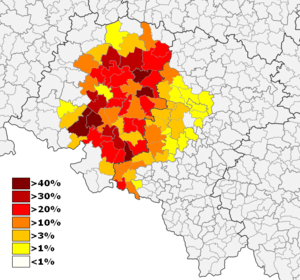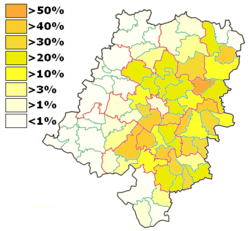German Minority Electoral Committee
| Headquarters |
ul. M.Konopnickiej 6 45-004 Opole ul. Wczasowa 3 47-400 Racibórz |
|---|---|
| Ideology |
German minority interests[1] Liberalism Regionalism Social market economy |
| Political position | Centre |
| Sejm |
1 / 460
|
| Voivodeship Sejmik of Opole Voivodeship |
7 / 30
|
| Website | |
|
www | |


German Minority (Polish: Mniejszość Niemiecka, German: Deutsche Minderheit) are representatives of the German minority in Poland in the Sejm, or the lower house of Polish parliament. Candidates of the German minority are proposed by the Social-Cultural Association of Germans in Silesian Opole (Towarzystwo Społeczno-Kulturalne Niemców na Śląsku Opolskim) and the Social-Cultural Association of Germans in Silesian Voivodeship (Towarzystwo Społeczno-Kulturalne Niemców Województwa Śląskiego).[2]
Programme
German Minority supports Polish integration with the European Union and the development of the region of Silesia, and argues for laws supportive of minority groups (in particular, the German minority in Poland).
National elections
As a national minority, it is not required to pass the election threshold of 5% as standard political parties in Poland are. National elections:
| election | votes | % | seats |
|---|---|---|---|
| 1991 Parliamentary elections | 132,059 | 1.18% | 7 |
| 1993 Parliamentary elections | 60,770 (+ 23,396) | 0.44% (+ 0.17%) | 3 (+ 1) |
| 1997 Parliamentary elections | 51,027 | 0.39% | 2 |
| 2001 Parliamentary elections | 47,230 | 0.36% | 2 |
| 2005 Parliamentary elections | 34,469 | 0.29% | 2 |
| 2007 Parliamentary elections | 32,462 | 0.20% | 1 |
| 2011 Parliamentary elections | 28,014 | 0.19% | 1 |
| 2015 Parliamentary elections | 27,530 | 0.18% | 1 |
In 1993 there were two lists, one in the Opole Voivodeship, one in the Katowice Voivodeship. The Opole list also won one seat in the Senate.
At the 2007 Parliamentary elections the candidate list to the Sejm (Polish parliament) got 8.81% of the votes in Opole Voivodeship, and only one seat in the Sejm, Ryszard Galla (8,193 votes). He had already won a seat in 2005 and had announced the rise from 2 to 3 seats as an electoral goal early in September, thanks to the personal votes of local mayors who were supposed to reinforce the list.[3][4] The second former Sejm deputy, Henryk Kroll (7,897 votes), lost his seat and announced his resignation from the chairmanship of the Social-Cultural Association of Germans in Silesian Opole, whose delegates are due to elect a new president early 2008. The 3 candidate list for the Senate of Poland didn't succeed in winning a single seat. According to the bilingual weekly Schlesisches Wochenblatt, votes won by the German Minority list could have benefited the Civic Platform (PO), for whom 6,000 to 8,000 ethnic Germans would have voted.[5]
In 2011 the list got 8.76% of valid votes in the Opole constituency, and more than 20% in 3 powiat (Krapkowice County, Opole County and Strzelce County) out of 12. Ryszard Galla was reelected as the sole MP from the German Minority with 11,794 personal votes.[6][7]
Regional elections
Local elections to the Opole Regional Assembly:
| Year | Votes | % | Seats |
|---|---|---|---|
| 1998 | ? | ? | 13 |
| 2002 | 54,385 | 18.61 | 7 |
| 2006 | 49,131 | 17.30 | 7 |
| 2010 | 53,670 | 17.77 | 6 |
| 2014 | 41,889 | 14.90 | 7 |
References
- ↑ Nordsieck, Wolfram (2015). "Poland". Parties and Elections in Europe. Retrieved 4 July 2018.
- ↑ http://www.dfkschlesien.vdg.pl/
- ↑ Kampf um drei Sejm-Mandate, Schlesisches Wochenblatt 12/09/2007
- ↑ Engelbert Miś, 21 Kandidaten für den Sejm, 3 für den Senat, Schlesisches Wochenblatt 19/09/2007
- ↑ Nur Ryszard Galla bleibt im Sejm, Schlesisches Wochenblatt 24/10/2007
- ↑ Election results »Poland»Sejm constituency no. 21, National Electoral Commission
- ↑ Komitet Wyborczy Wyborców Mniejszość Niemiecka, National Electoral Commission
Bibliography
- Rabagliati, Alastair (2001). A Minority Vote. Participation of the German and Belarusian Minorities within the Polish Political System 1989-1999. Kraków: Zakład Wydawniczy NOMOS. ISBN 83-88508-18-0.
External links
- Official website (in Polish)